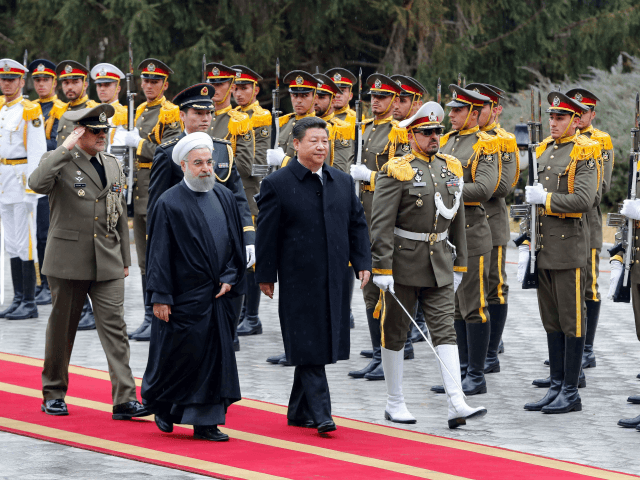The collapse of the rial currency and the looming threat of U.S. oil sanctions, scheduled to take hold in November, are reportedly leading Iran to turn to China for help keeping their economy afloat. A report Thursday suggests that China, itself struggling amid U.S. tariffs, may not be looking to save Iran and is diminishing its imports of Iranian oil.
The Associated Press (AP) noted in a report Wednesday that shoppers in Tehran’s Grand Bazaar have become accustomed to an influx of inferior Chinese products replacing the Western imports they became accustomed to as sanctions began to bite.
“From Chinese goods flooding markets to its business people eager for deals as Western business interests flee, Iran likely will further embrace Beijing as an alternative market for its crude oil and financial transactions amid uncertainty over the nuclear deal,” the outlet concludes. It cites several experts, including Peter Harrell, a fellow at the Washington-based Center for a New American Security, who predicts that, as plenty of Chinese companies do not have a full open avenue to American trade, “Iran is going to be able to continue large quantities of trade there, assuming the Chinese government lets that happen.”
Whether the Chinese communist regime is in a position to accept the consequences of trade with Iran remains a major unknown. The Chinese Foreign Ministry has repeatedly claimed it would maintain friendly relations with Iran despite warnings from the United States and has offered to intervene to Iran’s benefit in nuclear deal negotiations. Caught in the middle of an escalating trade war with Washington, however, the reality of bilateral commerce does not reflect Beijing’s vocal support for Tehran.
According to a Bloomberg News report published Thursday, China has dramatically reduced purchases of Iranian oil, leading to Iran enduring an 18-day gap between its last two shipments to China – the longest such gap in at least three years. The outlet notes that Iran’s oil exports have dropped to 1.3 million barrels a day, down from over twice that a three million a day in 2016. China remains Iran’s largest purchaser but appears to be trending away from buying more.
Bloomberg suggests that China may not necessarily want to cut ties with Iran – the decline in exports “might indicate that the Asian country’s refineries want better terms for Iranian cargoes.”
China is not alone in limiting its purchases from Iran, nor has it been the country to cut the most deals. India, the Agence France-Presse reported on Thursday, has cut its Iranian oil purchases by almost half. China has, however, reduced their number by 25 percent, potentially a larger share of the market given how much oil China buys from Iran.
The bleak outlook in Chinese oil purchases stands in contrast to predictions as recently as May that China would step in to fill the void the West would leave in the Iranian market if the United States restored oil sanctions that were in place before the signing of the Joint Comprehensive Plan of Action (JCPOA, or Iran nuclear deal). China’s Global Times, a government propaganda newspaper, claimed that month that “experts” believed China would soon “play a more important role in Middle East affairs,” and Iran specifically, as a result of President Donald Trump’s policies.
In August, China sent Foreign Minister Wang Yi to Tehran to assuage concerns that Beijing was looking to spend less money in the country and received President Hassan Rouhani in Beijing to solidify ties.
“We have openly indicated that we oppose the wrong practices of unilateral sanctions and ‘long-arm jurisdiction’ in international relations,” Wang said in a subsequent conversation with Iranian counterpart Mohammad Javad Zarif.
That month, however, amid the ongoing trade negotiations with Washington, the U.S. State Department warned China that not abiding by U.S. sanctions on Iran starting in November would result in significant damage to its economy – and, specifically, that China would not receive any special treatment or absolution on sanctions violation punishment if it continued to do business with China. Beijing has insisted it would not allow such considerations to change its positions, but nonetheless diminished its Iranian oil imports.
A concern independent of the relationship between China and the United States is the collapse of the Iranian economy. The Iranian rial hit a record low of 100,000 rials to one U.S. dollar in July and has continued to fall. Iranians in the middle and working classes struggle to purchase eggs, meat, and other basic goods at reasonable prices, triggering nationwide protests throughout the summer. The protests target not U.S. sanctions, but the Islamic regime for spending the billions gained from the nuclear deal on wars in Yemen, Syria, and elsewhere. A report in early September suggested that, like its ally Venezuela, Iran is considering implementing a food ration system to keep the peace.

COMMENTS
Please let us know if you're having issues with commenting.